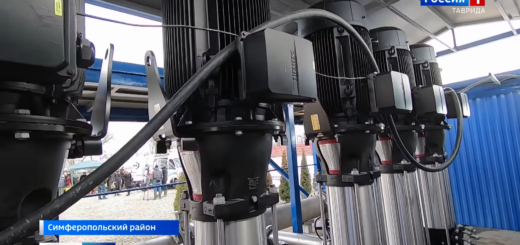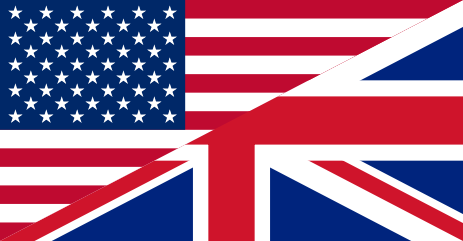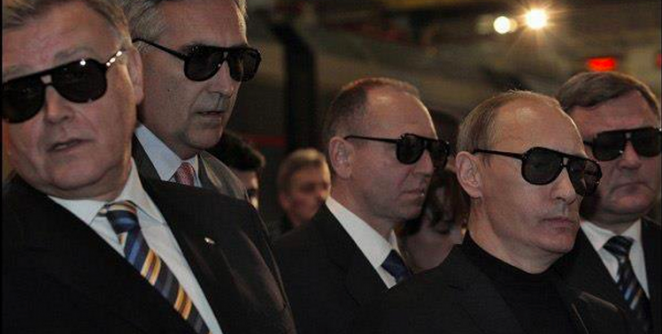Part 2. Patties for the dogs of war
How the business of providing catering services to the Russian military emerged and gained strength; how the businessman’s structures used the money that would be enough to build a bridge to Crimea; why relations between Prigozhin’s companies are obvious to the inspection bodies but are still being ignored; what is the point in creating so many tourism companies. Joint investigation of Current Time and «Municipal scanner».
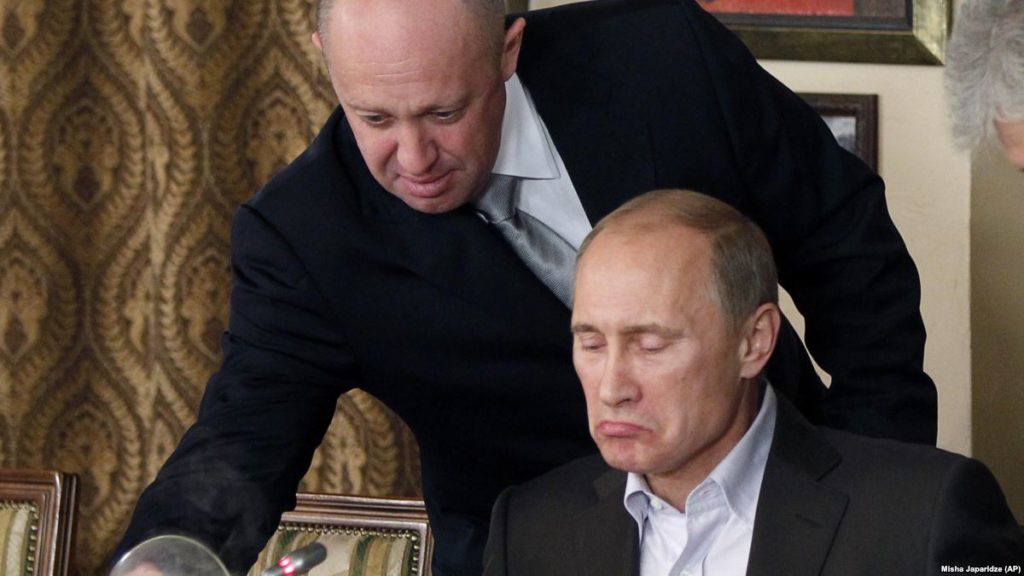
SERDYUKOV’S HERITAGE
In the Soviet (and later Russian) army, conscripts used to do everything: cook, clean, build. They were used as a free workforce, sometimes for personal ends of their commanders. Not much time was spent on the actual military training. In 2007, Anatoly Serdyukov became the head of Russian Armed Forces. He was disparagingly nicknamed «Cabinet Maker»: Serdyukov’s management career started from a furniture store.
In January 2008, conscription term was reduced from two years to one. In August, the Russo-Georgian war started. The command was unhappy with its results, so a large-scare reform of the army was initiated.
Military units were reorganized, the troops were rearmed and their technical equipment was updated, but those weren’t all the changes. From then on, all fatigue duties previously done by the conscripts were transferred to public institutions. This created a new market niche, and Prigozhin’s empire occupied a significant part of it.
ENDLESS NETWORK
According to our calculations, since 2011 companies of Prigozhin’s empire have signed at least 5393 state contracts on a total amount of 209,23 billion rubles.
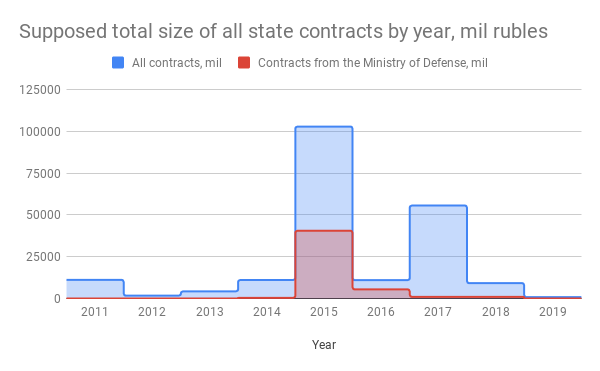
It’s important to understand that 209 billion rubles isn’t the final amount. Prigozhin doesn’t admit that some of these companies are his, since they are formally owned by his employees or other nominees. However, the main reason for the concealment of the actual amounts of state contracts was the decision by prime minister Dmitry Medvedev. In 2017, he allowed «Voentorg» and other subsidiaries of the Ministry of Defense to conceal information about public procurements. It is also known that many companies hadn’t received any public state contracts from the Ministry of Defense even before that, but still provided their services to military units.
Here’s how it works on the example of Pavel Arnold, director of «Obshchepit» company, whose relation to Prigozhin is described in the first chapter. Together with one Alla Petrova, Arnold founded the «Litera» company. Petrova herself owns OOO «MTTs». «MTTs» has never received any state contracts, but it’s known that in 2013, it provided its services to military unit 63559 (Domna village in Chita oblast).
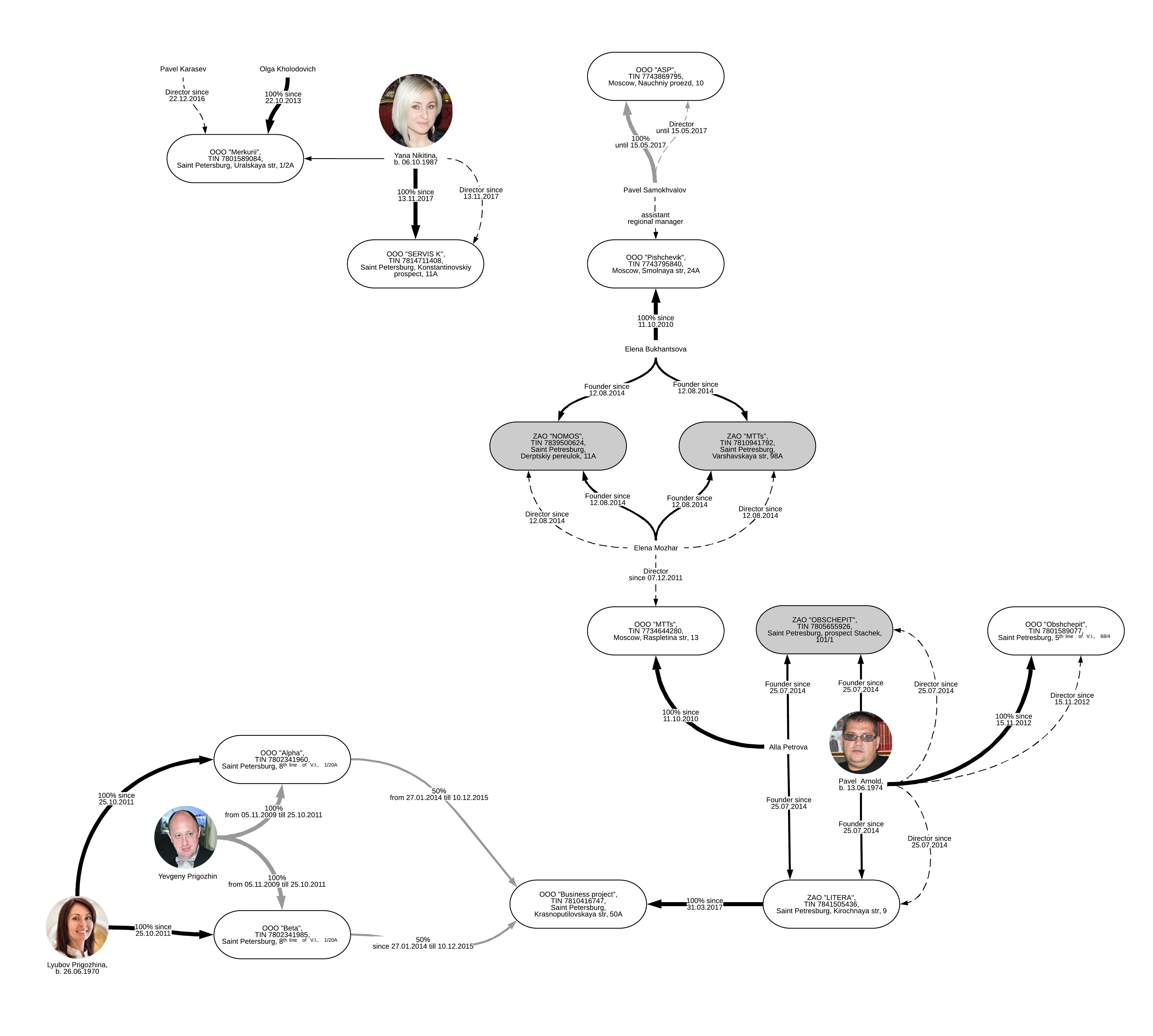
According to the documents, the director of «MTTs» is Elena Mozhar, who together with Elena Bukhantseva founded what back then was ZAO «MTTs» in 2014. Together with OOO «Obshchepit», Arnold also founded ZAO «Obshchepit», which carried this name until 2018. There is no doubt that these two legal entities are interrelated with the others.
The same Elena Bukhantseva who was one of the originators of «MTTs» acts as the owner of OOO «Pishchevik» since 2010. This company has state contracts with the Ministry of Defense for the supply of food identical to the food Arnold’s «Obshchepit» supplies to the Russian army.
In 2016, labor inspection in Vladimir oblast detected a violation at «Pishchevik» — it didn’t inform the authorities about an accident. «Pishchevik» was fined for 115 thousand rubles. Assistant regional manager Pavel Samokhvalov was recognized as the violator. Until May 2017, he was the director and nominee of OOO «ASP». This company has another 12 state contracts for 2.6 billion rubles with «Voentorg» and other subsidiaries of the Ministry of Defense.
«MTTs», «Pishchevik», «Obshchepit», «Merkurii» and «ASP» are listed at the «Voentorg» website as «partners in catering service» Let’s return to the helipad from the first chapter, where the helicopter of Arnold’s «Obshchepit» company is stationed. During a labor inspection of «Obschepit», its interests were represented by Irina Medved. She also represented «Merkurii» by power of attorney in January and February 2017 during inspections by the state labor inspector.
Multiple business structures having a common lawyer can be a coincidence, but normally this means that these companies are affiliated, and fiscal bodies should take note of such relations, professor Sergey Chernykh explained to CT.
Another similar relation
In 2017, Arbitration Court of Moscow considered a claim by the Ministry of Defense against its subsidiary. The ministry accused «Voentorg» of violation of a contract. «Pishchevik», «Kollektiv-Servis», «Obshchepit», «MTTs» and «Merkurii» were involved in the proceedings as third parties. All these companies were represented in court by the same person, one K. V. Shkodkina. CT was unable to find the full name of this lawyer.
«Merkurii» company was already mentioned earlier in this investigation — it was the owner of the Robinson helicopter that crashed near the «Lakhta» helipad. Olga Holodovich is listed as the owner of «Merkurii» since 2013. «Merkurii» is hiring dishwashers, loaders, chefs and kitchen workers in the Russian Far East. In many ads, Yana Nikitina is listed as the contact person of «Merkurii». Since November 2017, she is also the director and nominee of OOO «Servis K» — another company affiliated with Prigozhin.
It’s all about the people
You can get the idea of how «Obshchepit» fed the soldiers and officers from the lawsuits filed to the Arbitration Court of Moscow by «Voentorg» in 2015. The cause for them were the random inspection visits to various military units conducted in accordance with the agreement №OP-13-8.
As follows from the court decision, on May 7, 2014, an inspection was conducted at the military unit 01485 in stanitsa Storozhevaya . It revealed an underweight in all batched dishes at the soldiers’ canteen.
It was very small, not more than a few grams per person. The inspectors most probably divided the weight of the common cauldron by the number of eaters. According to the case files, on the eve of the Victory Day, the soldiers fell short of 1.5 kilos of beef in the minced beefsteak and 4 kilos of herring.
The manager of «Obshchepit» canteen was Evgeny Faroshkin. He transferred to this company after his demobilization. Before that, major Faroshkin worked at the military unit 20634 in Vladikavkaz as the head of catering service. By decision of the Pyatigorsk military court, he compensated material losses to the military unit (the amount wasn’t disclosed). Faroshkin was accused of «using his authority contrary to the interests of his service and following his personal interest in order to conceal the shortage of food».
The Ministry of Defense isn’t the only major customer of Prigozhin’s companies. His structures supply food to schools («Concord», «Combinat doshkolnogo pitaniya», «Shkolnik-YZ», «Sotsialnoye pitaniye “Tsentr”», «Moskovsky Shkolnik» and «Vito-1») and healthcare institutions(«ProdFutServis» «AVK»).
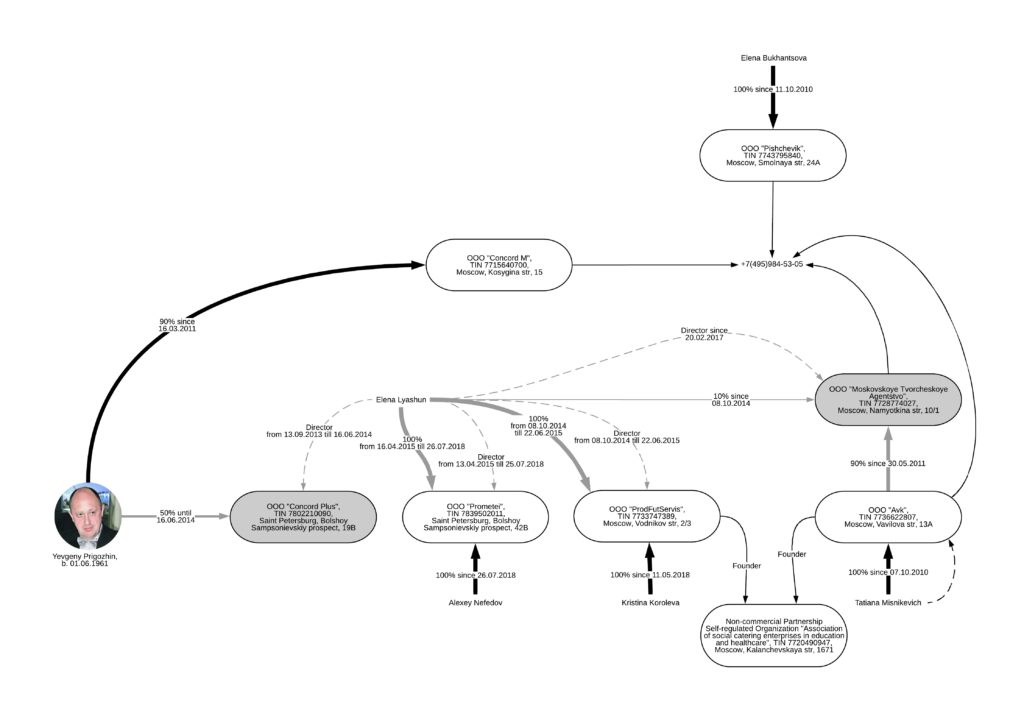
Until 2014, the director of «Concord Plus» was Elena Lyashun, who also acted as the nominee of «Prometei» and «ProdFutServis» and co-owner of «Moskovskoye tvorcheskoye agentstvo».
90% of «Moskovskoye tvorcheskoye agentstvo» was owned by OOO «AVK», which together with «ProdFutServis» founded the «Association of social catering enterprises in education and healthcare». In January 2019, the Association announced on its website that it has filed a lawsuit against Radio Liberty following its article «Why kindergartens were hit by dysentery».
CT found out that, according to the «Contour Focus» service, «Concord M», «Pishchevik», «AVK» and the liquidated «Moskovskoye tvorcheskoye agentstvo» had the same contact number.
One company that stands out from the rest of Prigozhin’s companies that received state contracts is «Megaline». Until September 2013, «Megaline» was personally owned by Evgeny Prigozhin and his mother Violetta through OOO «Lakhta». In December 2015, the ownership of 50% of «Megaline» was transferred to «Business project» — the company that owns Prigozhin’s yacht and plane.
«Megaline» has been receiving state contracts from the Ministry of Defense to provide maintenance for its properties (including the «Patriot» park infamous for its model of the Reichstag) and to design a military base in Korenovsk in Krasnodar Krai.
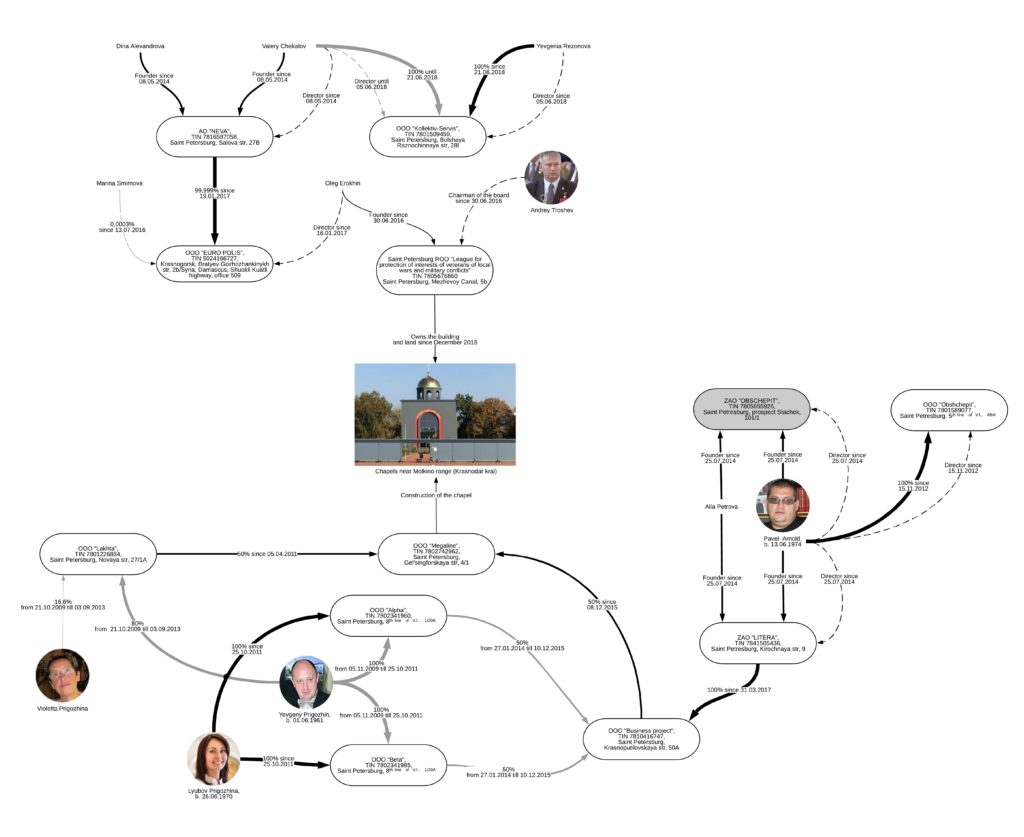
«Megaline» was a part of Prigozhin’s cartel when he was signing state contracts with the Ministry of Defense. The scheme was uncovered by the Anti-Corruption Foundation and partially recognized by the Anti-Monopoly Service. According to the ACF, the essence of the fix-up was that Prigozhin’s structures agreed to participate in tenders together and managed to maximally reduce the initial prices of the state contracts. According to politician Alexey Navalny, the companies received 23.5 billion rubles, out of which 8 billion were stolen. The court has only recognized a part of the contracts on the total amount of 1.5 billion rubles as a cartel agreement and issued a fine.
This happened in 2017. One year later, «Megaline» started constructing a chapel sacred to the memory of Russian volunteers who died in Syria next to the Molkino range in Krasnodar krai, where the training camp of Russian mercenaries is located. When asked about the costs and reasons for construction of the chapel, Pavel Arnold gave no answer and asked not to disturb him again.
As BBC found out, in December 2018, the chapel that «Megaline» built and the land under it became property of the «League for protection of interests of veterans of local wars and military conflicts». The chairman of the board of the «League» is Andrey Troshev, Hero of Russia, participant of the military operation in Syria and on of the commanders of the private military company created by Dmitry Utkin, who is better known by his call sign “Wagner”. The «League» was founded by Oleg Erokhin, director of «Euro polis».
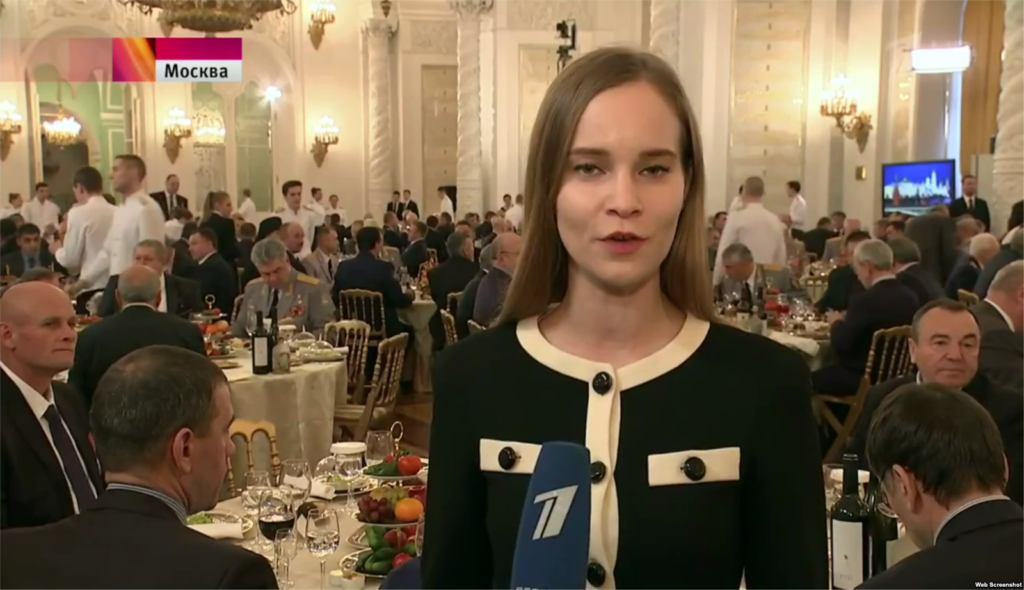
In early 2018, «Euro polis» signed an acceptance contract for work in Syria. In 2016, «Euro polis» signed a memorandum at the meeting between the Syrian minister of oil and the Russian minister of energetics. According to «Fontanka», the company lays claim to a quarter of all oil and gas extracted in Syria at the territories won back for Bashar Assad’s government. «Euro polis» promised to liberate deposits and objects of Syria’s oil refining infrastructure from ISIS members and guard them afterwards.
In February 2018, around 300 fighters of the private military company were wounded and around 80 were killed as a result of a US air strike during the attempt to capture a refinery in the Syrian province of Deir ez-Zor. On January 26, 2018, «Euro polis» was added to the US sanctions list.
The owner of «Euro polis» is AO «Neva», which was founded in 2014 by Valery Chekalov. From 2016 till 2018 Valery Chekalov was the owner of «Kollektiv-Servis». A court decision states that this structure had catering contracts with «Voentorg» and other subsidiaries of the Ministry of Defense.
DOES IT HAVE TO BE SO COMPLICATED?
The examples of chains of relations between Prigozhin’s companies are very important for the better understanding of the structure of his business, which is impossible to grab by any pinpoint inspections or investigations. Such a large picture is too difficult to hold in one’s head — hardly anyone will bother to thoroughly study tens of companies that are receiving state contracts.
CT asked the experts to explain why a business may need such a complicated and intricate ownership scheme and why inspection bodies don’t notice that these companies are obviously affiliated.
They spoke on the condition that they won’t be told the name of the final beneficiary of the chain, but one of the experts quickly figured out who it is and only agreed to be quoted on condition of anonymity. «Considering this gentleman’s toxicity, I agree to be your source in the business circles», — he said.
«This is classic. Two or three structures enter the bidding, but all of them belong to you, so you win contracts with a minimal step. You create some sort of a holding of companies that allegedly aren’t related, although sometimes bidders even share the same address, director or e-mail. This is verifiable, it’s happened a thousand of times will happen a thousand more times. You can go to jail for this», — says the expert who asked not to be named.
Professor Sergey Chernykh listed the signs of affiliation between companies: «When there are the same people who either work at other companies or participate in their business activities in some other way, plus third party that either protects or provides services to them on an outsource basis. These are the signs of malignity of the financial chains that include these companies». According to the professor, businessmen usually avoid the risks related to affiliation, since «fiscal bodies monitor this very closely».
«They just operate blatantly and hope there will be someone to cover them», — concludes the expert.
When asked about the cost of maintaining such a structure, both interlocutors said that a branching network will, on contrary, allow to save money and «provide room for maneuver», and all such companies are serviced by «one team of managing accountants»
CT sent out 12 questions regarding the relations between Yevgeny Prigozhin, «Concord management and consulting» and the companies mentioned in this investigation. The organization’s media office stated that it has no obligation to answer Current Time’s questions, and Yevgeny Prigozhin called one of the co-authors of this article Timur Olevskiy «a little dirty bastard». The questions and the response were published on the VK page of the media office.
In the next part, you will learn about the seamy side of Prigozhin’s empire: how formally unrelated companies take loans from each other; why they are doing this; what Prigozhin’s structures procure and how it’s used in African countries.
Mikhail Maglov, Timur Olevskiy, Dmitry Treshchagin
Current Time

